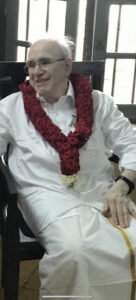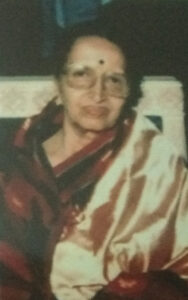Registered with the Registrar of Newspapers for India under R.N.I 53640/91
Vol. XXX No. 21, March 1-15, 2021
Remembering a medical couple
by Dr. Anirudh Nandan
Dr. K.V Thiruvengadam & Dr. Malathi Thiruvengadam
From Madras Musings Archives
Dr. K.V.T, the Padma Shri awardee
– by Shobha Menon
Dr. K.V. Thiruvengadam, popularly known as Dr. KVT, is an eminent physician and clinician whose skills are the last word in diagnosis. He has been witness to an era in medicine, from excited professors holding up a vial of chloramphenicol with reverence to the present developments in telemedicine.
Dr. KVT reminisces, “I had finished my B.Sc Chemistry and was being interviewed for entry to an engineering course in Guindy Engineering College. My impressive marks in Human Physiology prompted the legendary Sir A.L. Mudaliar (then on the interview panel) to persuade me to apply for medicine and so I joined Madras Medical College, though it happened to be just for 20 days. On the next day, a cycle messenger came over from Stanley and informed me that if I did not report the next morning at Stanley Medical College, my medical course admission would be cancelled! Only then, I realised that a letter had been sent transferring me to SMC (and it had languished unattended in my letter box). The transfer was necessitated because MMC wanted to replace me with another medical student who was also a good footballer (then much needed by MMC). However, to my dismay, I was asked to pay fees again, though I’d already paid up at MMC. The kind Vice-Principal loaned me Rs.120 to meet it.”
It was well into World War II before antibiotics reached Madras for the first time. In Dr. KVT’s words – “Those days we had to wear masks while opening a vial! Streptomycin was to be used selectively and chloramphenicol for treatment of typhoid had to be reverently handled.”
Dr. KVT also remembers the inauguration of the new outpatient block at Stanley in the late 1960s and the building of the new surgical block behind the demolished Gray Ward where, once, he recalls, French nuns were looking after the terminally ill. He was also present during the period when Paediatrics was developed as a distinct specialty at the hospital, with Dr. A. John as the first paediatrician; he also remembers the emergence of the Medical Oncology block.
When Dr. KVT was Vice-Principal at Stanley Medical College, Dr. A.N.K. Menon was Dean, and Dr. Kutumbiah, the Principal and “the office, a well-oiled machine”! Dr. KVT’s eyes sparkle as he remembers eminent stalwarts like Dr. Mahadevan, the first surgeon to open the heart in the 1940s; Dr. Kini, an ortho-surgeon of outstanding ability; Prof. Ananthanarayanan, who “had a wonderful way of teaching Anatomy, especially embryology – with no slides or powerpoint projectors at that time, he could put romance even into Embryology”; and gynaecologist Dr. Madhavan, who was known for his sartorial elegance, “used to come any time at night, very fast in his Vauxhall car.”
Dr. KVT finishes our conversation with a final comment – “In Government service, if you have the will you can do a lot of work. Many of our patients were very poor, had to be housed on cots and below cots. Many times, with no money even to go home. From Poor Fund, it’d take a long time to get funds. So, we’d reimburse them most times!”

Dr. K.V. Thiruvengadam.

Dr. Malathi Thiruvengadam.
Dr. K.V. Thiruvengadam and Dr. Malathi Thiruvangadam passed away in recent times, at the ripe old ages of 93 and 91 respectively. Highly respected in the medical field, the couple leave behind inspiring careers marked by public service. This article, however, is dedicated to their legacies as grandparents.
Dr. K.V. Thiruvengadam was an esteemed clinician and teacher. He inspired a flood of articles written by his colleagues celebrating his life and career. His dedication to ethical medical practice and holistic patient care inspired generations of students to strive for medicine’s highest ideals.
To thousands of patients over his decades of practice, Dr. K.V. Thiruvengadam was a diagnostician and a healer. He conducted his clinics in a home office, separated from his living room by a thick, wooden door. On one side of this door, Dr. K.V.T. presided over his medical practice, with piercing fluorescent lights and sharp antiseptic odours hanging over tumbling stacks of medical paperwork. But at the end of his workday, when he opened that wooden door and stepped into the bright chaos of his living room, he was simply known as thatha. To his grandchildren, who could be reliably found engaging in some mischief in this living room, what thatha did in his office remained somewhat mysterious. To them, he was defined not by his medals or accolades, but by the love and affection he showered on them.
Thatha had a soft-spoken, gentle demeanor that endeared him to his family. While paati would never hesitate to call out her grandchildren for creating havoc in the living room, thatha rarely descended into the fray. He sat in his favorite chair, his nose buried in a medical journal, and peeked above the pages to offer the rare half-hearted scolding. He had a propensity to start chuckling during his reprimands, which markedly reduced their impact on curbing unruly behavior.
During free time spent with his grandchildren, thatha loved to share stories. When his grandchildren were young, these stories were lighthearted and playful, often focusing on the adventures of the fictional character Tarzan. As thatha grew older (and his grandchildren did too), his fantastical stories turned into lessons about life and the wisdom of experience. Thatha shared his values, his ideals, and the strong ethical code that guided his personal and professional life. The legacy he left for his family was every bit as important as the one he left for his patients and colleagues – thatha will always be remembered for his unshakeable commitment to excellence, his compassion, and his infinite kindness.
Much like Dr. K.V.T, his wife Malathi Thiruvengadam lived a life of selflessness and consequence. She was quite brilliant – she was a trained physician and a gifted musician, too. She was a pillar of strength for her family.
When a young Malathi (née M. Malathi) chose to attend medical school, it was not for lack of other options. Her intellectual curiosity and work ethic had resulted in top marks in a variety of disciplines, from mathematics to French. These accolades were hard-fought and well-deserved. When Malathi saw professors discriminate against her in favor of male students, she spoke up and demanded fairness. When Malathi saw this happen to others, she did the same. Later, those who heard Malathi’s stories about her schooling would notice a theme – she advocated courageously for equality and fairness. She demanded that people be judged on their merits alone. After the completion of her medical training, Dr. M. Malathi (then Dr. Malathi Thiruvengadam) spent over twenty years practicing obstetric medicine, before retiring to care for her family. A devoted wife and mother, she tended to her household with the same passion and commitment that had characterised her career in medicine. Decades later, her grandchildren would learn lessons in courage at her knee.
Malathi paati, no less outspoken than the young M. Malathi, turned her attention to sharing her knowledge with the next generations. To her grandchildren, there seemed to be no skill paati did not have – she was a singer, a violinist, a seamstress, an accountant, a polyglot. Her talent for horticulture was on full display in the thicket of plant life that surrounded her house. On many a warm summer evening, as sunlight faded into a dull purple horizon and the storefront lights of G.N. Road flickered to life, Malathi paati could be found walking her grandchildren around the yard, sharing her plans to harvest mangoes from the towering trees that shaded the back windows. Every year, she delivered on this promise, and an entire room of the house would be filled with mangoes from the ground up, soon to be parceled and delivered to neighbors, family, and friends.
As the years passed and the physical demands of gardening caught up to her, Malathi paati pivoted into a new pastime. In her mid-80s, at an age when few others would dream of learning new tricks, paati decided to teach herself Sanskrit. She sat in one corner of her living room as thatha sat in the other – he, browsing through medical journals with Carnatic music playing on the radio; she, poring over verb conjugation in her Sanskrit textbook. During breaks in her studies, she shared stories of her childhood – of growing up the daughter of a forest officer, of early years in schooling, and of the values that came to define her. To her grandchildren, paati’s love for learning would leave a lasting imprint. Through word and deed, she modeled the virtues of lifelong curiosity and unshakeable tenacity.
Malathi paati served as a shining example of life well-lived. She will be missed dearly by all those who knew her, and generations of her family will be forever molded by the wisdom she imparted.

